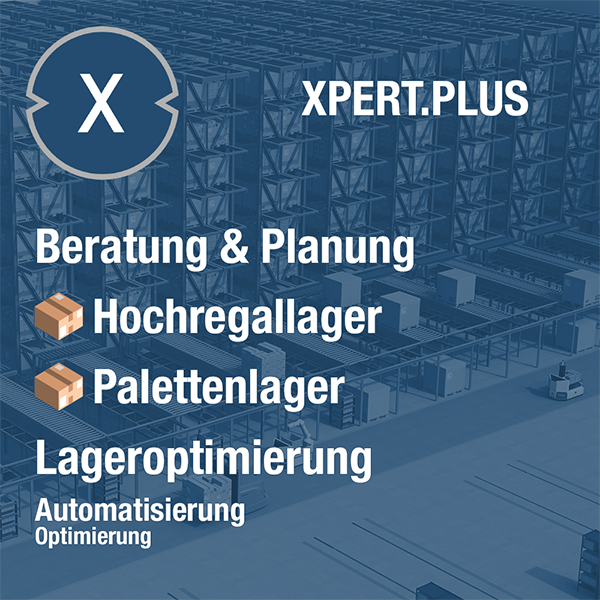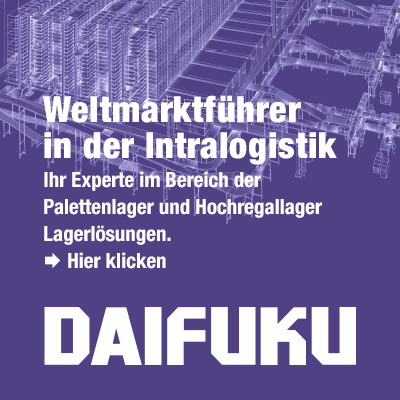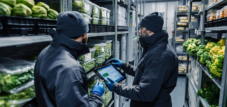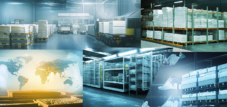Refrigerated logistics in Brazil: Challenges and opportunities in cold logistics and fresh produce logistics in a global comparison
Xpert pre-release
Language selection 📢
Published on: January 14, 2025 / update from: January 14, 2025 - Author: Konrad Wolfenstein

Refrigerated logistics in Brazil: Challenges and opportunities in cold logistics and fresh logistics in a global comparison - Image: Xpert.Digital
Temperature-sensitive goods in focus: How Brazil can exploit its potential in refrigerated logistics
Climate, economy, logistics: This is how Brazil is mastering the challenges of the temperature-controlled supply chain
Refrigerated logistics is a crucial part of global trade in temperature-sensitive goods such as food, pharmaceuticals and chemicals. Brazil, as one of the largest economies in the world and an important agricultural producer, faces particular challenges and at the same time offers great opportunities in this area. A comparison with the USA and Europe shows the specific conditions facing Brazil and illustrates how the country could develop its potential in refrigerated logistics.
Infrastructure
Efficient refrigerated logistics requires a robust infrastructure to transport temperature-sensitive goods safely and in a timely manner. In the USA, well-developed road, rail and air freight networks ensure that long distances can be covered. Europe relies on regional approaches with highly developed logistical networks. In contrast, Brazil faces significant infrastructural deficits.
Brazil's road network is often in poor condition, leading to delays and higher transportation costs. Rail transport, which could provide more efficient and environmentally friendly transport options, is underdeveloped and is mainly used for raw material exports. Modernizing this infrastructure is essential to improve refrigerated logistics and meet the demands of a growing market.
Programs like the Partnership for Global Infrastructure and Investment offer Brazil opportunities to make progress through international collaboration. Investments in modern logistics centers, rail and road networks could help shorten transport times and increase the country's competitiveness.
technology
Technological progress plays a central role in the further development of refrigerated logistics. In the USA, IoT (Internet of Things), real-time monitoring and big data are already firmly integrated into logistics processes. Europe is also placing a focus on sustainable technologies. Brazil has made progress in this area, particularly through the use of IoT devices to monitor cold chain integrity. Nevertheless, there is still a need to catch up.
The digitalization of the power grid in Brazil offers an opportunity to build energy-efficient and stable refrigerated logistics systems. Through smart networks and renewable energy integration, Brazil could not only improve sustainability but also reduce operating costs. Advanced technologies such as blockchain could also help increase the traceability and security of supply chains.
regulation
Regulatory regulations have a significant impact on refrigerated logistics. Europe has strict food safety standards that require efficient and safe logistics. The USA relies on robust but flexible regulations that promote innovation. Brazil also has safety standards, but there is often a lack of harmonized and transparent requirements.
Simplifying regulation could improve business conditions and attract investment. For international companies in particular, clearer and more uniform legislation would be an incentive to invest in Brazilian refrigerated logistics.
Market size and growth
The refrigerated logistics market in Brazil has grown significantly in recent years. In 2020, it was valued at $1,616.43 million, with a forecast to rise to $3,289.12 million by 2026. This growth is driven by an annual growth rate of 12.57%. The global market is showing similarly dynamic developments, with an expected value of USD 862.33 billion by 2032.
Brazil can benefit from this growth, particularly through increasing demand for chilled foods and pharmaceuticals. The COVID-19 pandemic has demonstrated the importance of a robust cold chain infrastructure to efficiently distribute vaccines and other temperature-sensitive products.
sustainability
Sustainability is a key factor in modern refrigerated logistics. Europe has taken a pioneering role here with energy-efficient technologies and green transport solutions. Brazil has committed to ambitious climate goals under the Paris Agreement and has made progress in renewable energy.
Programs such as the Ecological Transformation Program and the Fuels of the Future Program support the decarbonization of the Brazilian economy. The use of hydrogen fuel cells and energy-efficient cooling systems could further reduce environmental impact and increase the sustainability of refrigerated logistics.
Strengths and weaknesses
Brazil has numerous strengths that set it apart in global competition. These include a large domestic market, a strong position in agricultural production and a growing role in renewable energy. The stable financial system offers a solid basis for investments.
At the same time, there are weaknesses that inhibit growth. These include inadequate infrastructure, inefficient bureaucracy and high levels of corruption. The lack of integration of modern technologies and the dependence on raw material exports make the economy vulnerable to external fluctuations.
Opportunities and risks
Brazil offers great opportunities for investment in refrigerated logistics. Planned infrastructure projects and the use of renewable energy could make the country a key player in Latin America. Privatization and new technologies offer additional opportunities for growth.
However, the opportunities are offset by risks, including political instability and the negative impacts of climate change. Without clear strategies, these challenges could hinder the development of refrigerated logistics in Brazil.
Geostrategic location makes Brazil a promising location
Brazil faces major challenges in the area of refrigerated logistics, particularly in terms of infrastructure, technology and regulation. But the opportunities outweigh the odds: the growing market, progress in sustainability and the geostrategic location make Brazil a promising location for investments.
To realize its potential, Brazil needs to invest in modern technologies, sustainable energy sources and regulatory harmonization. Collaboration with international partners could play an important role here. Through technology transfer and joint projects, Brazil could sustainably consolidate its position in the global market.
With a clear strategy that focuses on sustainability and innovation, Brazil has the opportunity to establish itself as a pioneer in refrigerated logistics in Latin America. The integration of modern technologies and the expansion of the infrastructure could significantly increase the country's competitiveness and at the same time make a positive contribution to the global climate protection agenda.
Xpert partner in warehouse planning and construction
Refrigerated logistics worldwide: Where does Brazil stand compared to the USA and Europe?
Refrigerated logistics in Brazil: A decisive factor in global competition with complex challenges and promising opportunities
Refrigerated logistics represents an indispensable backbone of global trade in temperature-sensitive goods. Whether it is perishable food, sensitive pharmaceuticals or special chemicals - a seamless cold chain is essential to ensure the quality and safety of these products. Brazil, as an emerging economic power with an agricultural sector of global importance, faces specific challenges in this context, but at the same time presents significant opportunities. This analysis highlights refrigerated logistics in Brazil in comparison to the established systems in the USA and various European countries. Important aspects such as the existing infrastructure, the use of modern technologies, the regulatory framework, the market size and growth potential, the importance of sustainability as well as the specific strengths, weaknesses, opportunities and risks of the Brazilian market are examined in detail.
Infrastructure: A crucial factor for efficiency and competitiveness
Smoothly functioning and cost-efficient refrigerated logistics is inextricably linked to the quality of the existing infrastructure. In the United States, a country characterized by immense distances, complex and highly developed logistics solutions have been established. Europe, on the other hand, traditionally relies more on regional logistics approaches that are based on shorter routes and denser networks. In comparison, Brazil faces significant infrastructural deficits. In particular, the condition of the road and rail networks often leaves much to be desired. This not only leads to longer transport times, but also to significantly higher costs for companies. Experts emphasize that the modernization of the Brazilian infrastructure, in particular the expansion and maintenance of the rail transport network, is a crucial prerequisite for the sustainable improvement of refrigerated logistics in the country. A well-developed rail network could provide a cheaper and more environmentally friendly alternative to road transport, which is currently heavily congested.
With the “Partnership for Global Infrastructure and Investment”, the US government has launched an important initiative that aims to specifically support infrastructure projects in developing countries. This initiative is also a valuable opportunity for Brazil to steer urgently needed investments in the modernization of its cooling logistics infrastructure. Through cooperation with experienced US companies as part of this partnership, important impulses for the further development of Brazilian cooling logistics could be set. This would not only increase efficiency, but also strengthen the competitiveness of Brazilian products on the world market. It is not just about the expansion of roads and rails, but also about the modernization of ports and airports, which also play an important role in the cold chain.
Technology: The key to increasing efficiency and quality control
The use of modern technologies is becoming increasingly important in refrigerated logistics. Technologies such as the Internet of Things (IoT) and real-time monitoring systems enable precise control of temperature and other important parameters throughout the entire transport process. The USA is considered a pioneer in this area, while in Europe the focus is traditionally more on sustainability aspects. Although Brazil has made significant progress in integrating technologies into refrigerated logistics in recent years, it still lags behind in direct comparison to the USA and leading European nations. This applies to both the implementation of sensor networks for temperature monitoring and the use of advanced data analysis tools to optimize routes and for predictive maintenance of refrigeration units.
A promising area for Brazil is the increasing digitalization of the electricity grid. A modern and stable power grid is a basic requirement for the reliable operation of cold stores and refrigerated transport. Digitalization offers the opportunity to significantly improve energy efficiency and at the same time increase the stability of the energy supply. In addition, a smart power grid enables better integration of renewable energy sources, which can make a significant contribution to more sustainable refrigeration logistics. For example, cold storage facilities could be equipped with solar systems and feed excess energy into the grid. The use of real-time data to optimize energy consumption in refrigeration units is another application area of modern technology.
Regulation: A balancing act between security and competitiveness
Regulatory framework conditions have a significant impact on the efficiency and costs of refrigerated logistics. In Europe there are very strict regulations for food safety and quality, which directly affect the requirements for refrigerated logistics. These regulations aim to protect consumer health and ensure high quality standards. Brazil has also implemented food safety regulations. However, compared to the USA and especially Europe, there is still a lot of catching up to do when it comes to harmonizing and simplifying the numerous regulations in the area of refrigerated logistics. More complex and less transparent regulation may lead to unnecessary delays and costs and reduce the competitiveness of the Brazilian refrigerated logistics industry. More efficient and transparent regulation would make it easier for companies to comply with necessary standards while driving innovation in refrigerated logistics. This includes, for example, the standardization of temperature specifications for different product categories and the simplification of certification processes.
Market size and growth: A dynamic sector with great potential
The refrigerated logistics market in Brazil is in a phase of strong growth. In 2020, the market volume was estimated at around $1.6 billion. Forecasts suggest this value will rise to nearly $3.3 billion by 2026, representing an impressive annual growth rate of over 12%. This development is driven by various factors, including population growth, increasing consumption of fresh and frozen foods, and the increasing importance of exports to the Brazilian economy. The global cold chain logistics market was valued at around $294 billion in 2023 and is expected to reach over $862 billion by 2032, growing at a CAGR of approximately 13%. These figures illustrate the enormous potential of this sector worldwide.
Cold storage accounted for a significant share of the Brazilian market in 2022, worth over $238 million. This area is expected to grow to nearly $685 million by 2030, representing an annual growth rate of over 14%. While North America and Europe are currently the major players in the global refrigerated logistics market, Asia Pacific, particularly countries such as China, India and Japan, are also experiencing significant growth. Brazil has the potential to become a major refrigerated logistics center in Latin America and benefit from increasing demand in the region.
The COVID-19 pandemic has had a profound impact on the refrigerated logistics market worldwide. The demand for temperature-controlled storage and transport of vaccines and medicines exploded. At the same time, disruptions in global supply chains and logistics networks created significant challenges and highlighted the immense importance of a robust and resilient cold chain infrastructure. The pandemic acted as a catalyst for digitalization and the introduction of innovative technologies in refrigerated logistics to ensure the safe and efficient distribution of temperature-sensitive goods even under difficult conditions.
Sustainability: An increasingly important competitive factor
Sustainability is a topic that is becoming increasingly important in refrigerated logistics globally. In Europe, energy-efficient technologies and environmentally friendly transport solutions are the focus of many companies. This includes, for example, the use of alternative fuels, the optimization of transport routes to reduce fuel consumption and the use of energy-efficient cooling units. Brazil has made notable progress in sustainability in recent years, particularly in the energy sector. Increasing the use of renewable energies such as solar and wind power and reducing emissions are key goals for the Brazilian refrigerated logistics industry. As part of the Paris Climate Agreement, Brazil has set ambitious goals to reduce greenhouse gas emissions, which also affect refrigerated logistics. The industry is faced with the task of making its contribution to achieving these goals.
The “Ecological Transformation Program” and the “Fuels of the Future Program” are important initiatives of the Brazilian government to promote sustainability in the energy sector. These programs have the potential to significantly influence the cooling logistics industry by promoting the use of renewable energies and supporting the development of more environmentally friendly technologies. This could include, for example, the increased use of electric vehicles in urban distribution traffic or the use of hydrogen as a fuel for long -distance transports.
Large logistics companies such as DB Schenker are also increasingly committed to sustainability in refrigerated logistics. They rely on innovative solutions to minimize the environmental impact of their activities. These include, for example, optimizing transport routes using artificial intelligence, using energy-efficient vehicles with lower emissions and using renewable energy in their warehouses and transshipment points.
Brazil is also increasingly focusing on the decarbonization of its rail network. The use of alternative energy sources such as batteries and hydrogen fuel cells for locomotives is intended to significantly reduce emissions in rail transport and thus improve the sustainability of the entire refrigeration logistics. This is an important step because rail freight transport generally causes significantly less environmental impact compared to road transport.
Strengths and weaknesses: A position assessment in global competition
Brazil has some key strengths in the area of refrigerated logistics that set the country apart in global competition. These include the large and growing domestic market in Latin America, which provides a solid demand base for refrigerated logistics services. The country's rich and diverse natural resources, particularly in the agricultural sector, form the basis for significant exports of temperature-sensitive goods. Brazil's strong position in agricultural production, particularly in areas such as meat, fruits and vegetables, creates high demand for efficient refrigerated logistics solutions. The comparatively stable and liquid financial system offers a solid basis for investments in the modernization and expansion of the refrigerated logistics infrastructure.
However, compared to the United States, which is a global leader in integrating automation, advanced data analytics and the Internet of Things (IoT) into refrigerated logistics, Brazil still has a significant amount of catching up to do in terms of technology. Europe, on the other hand, has traditionally focused more on sustainability and regional logistics solutions that are based on shorter transport routes and greater networking of various modes of transport. However, these regional approaches can also be a disadvantage in global competition because they may not be as flexible and scalable as the more centralized systems in the United States.
However, Brazil also has to deal with some significant weaknesses. The continued high level of corruption and an often inefficient bureaucracy make it difficult for many companies to do business and can hinder investments in refrigerated logistics. The lack of planning security for investments due to a lack of long-term strategies and consistent political guidelines represents another significant obstacle. The significant deficits in the infrastructure already mentioned, in particular the inadequate development of the road and rail network, significantly hinder economic growth and the efficiency of refrigerated logistics . Brazil's high dependence on raw material exports makes the economy vulnerable to fluctuations on global markets and can also have an indirect impact on investments in the logistics industry. Last but not least, the ongoing social inequality and a relatively high crime rate affect the quality of life and can have a negative impact on the investment climate.
Opportunities and risks: A look into the future of refrigerated logistics in Brazil
Brazil offers a number of promising opportunities in the area of refrigerated logistics. The excellent conditions for the further expansion of renewable energies open up the possibility of making refrigeration logistics more sustainable and independent of fossil fuels. The planned major investments in improving infrastructure, especially in rail transport, promise a significant increase in efficiency and a reduction in transport costs, which could increase the competitiveness of Brazilian products. Brazil has excellent natural resources and know-how for the development of a hydrogen economy, which could also find application in the field of refrigerated logistics through the use of hydrogen as a clean energy source. The ongoing privatizations and the awarding of infrastructure concessions are stimulating new private investments in the logistics sector and contributing to the modernization of the refrigerated logistics infrastructure. Brazil is leading the way in ESG (Environmental, Social, and Governance) in Latin America, paving the way for sustainable investments in the region, which can also benefit refrigerated logistics.
However, these opportunities are also accompanied by risks that should not be underestimated. The political instability, which is characterized by strong social polarization, represents a risk for investments and long-term economic development. The significant negative consequences of climate change on the environment and the economy that are already noticeable and will be expected in the future could directly and indirectly affect the refrigerated logistics industry , for example due to extreme weather events that make transport routes impassable or endanger energy supplies.
Brazil's path to competitive and sustainable refrigerated logistics
Brazil faces major challenges in the area of refrigerated logistics, particularly in terms of modernizing infrastructure, integrating modern technologies and optimizing the regulatory framework. At the same time, the growing market, the great potential in the area of sustainability and the leading position in the ESG area in Latin America offer significant opportunities for the further development of the industry. In order to successfully exploit these opportunities, targeted and sustainable investments in infrastructure, the consistent promotion of technological innovations and the continuous improvement of the regulatory framework are essential.
Accelerating the modernization of the rail network, the widespread integration of IoT technologies and real-time monitoring systems, and the harmonization and simplification of regulations are crucial steps towards improving the efficiency, reliability and sustainability of refrigerated logistics in Brazil. By consistently exploiting its strengths and specifically addressing its weaknesses, Brazil can sustainably strengthen its position in the global refrigerated logistics market and develop into an important and future-oriented player in Latin America.
Strategic cooperation with international partners, especially the USA and European countries, can provide Brazil with valuable support in overcoming the existing challenges and accelerate the exploitation of the diverse opportunities in the field of refrigerated logistics. Targeted technology transfer, the exchange of best practices and joint investment projects can significantly advance the development of the Brazilian refrigerated logistics industry.
Brazil has the potential to become a pioneer in sustainable refrigerated logistics in Latin America. By consistently implementing its ambitious sustainability goals and proactively using innovative technologies, Brazil can significantly minimize the environmental impact of refrigerated logistics while further expanding its competitiveness in the global market. The course has been set for a successful future for refrigerated logistics in Brazil. Now it is important to consistently use the opportunities and tackle the challenges resolutely.

Xpert.Plus warehouse optimization - high-bay warehouses such as pallet warehouses consulting and planning
We are there for you - advice - planning - implementation - project management
☑️ SME support in strategy, consulting, planning and implementation
☑️ Creation or realignment of the digital strategy and digitalization
☑️ Expansion and optimization of international sales processes
☑️ Global & Digital B2B trading platforms
☑️ Pioneer Business Development
I would be happy to serve as your personal advisor.
You can contact me by filling out the contact form below or simply call me on +49 89 89 674 804 (Munich) .
I'm looking forward to our joint project.
Xpert.Digital - Konrad Wolfenstein
Xpert.Digital is a hub for industry with a focus on digitalization, mechanical engineering, logistics/intralogistics and photovoltaics.
With our 360° business development solution, we support well-known companies from new business to after sales.
Market intelligence, smarketing, marketing automation, content development, PR, mail campaigns, personalized social media and lead nurturing are part of our digital tools.
You can find out more at: www.xpert.digital - www.xpert.solar - www.xpert.plus


























